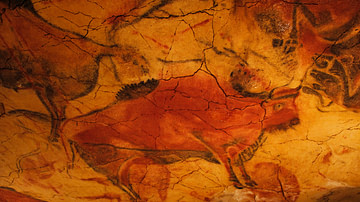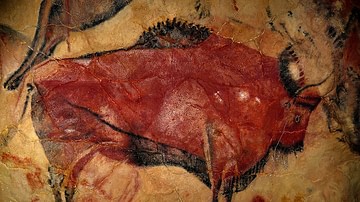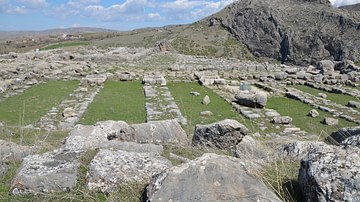Search
Remove Ads
Advertisement
Summary 
Loading AI-generated summary based on World History Encyclopedia articles ...
Search Results

Article
The Meaning of European Upper Paleolithic Rock Art
Rock art (also known as parietal art) is an umbrella term which refers to several types of creations including finger markings left on soft surfaces, bas-relief sculptures, engraved figures and symbols, and paintings onto a rock surface...

Definition
Paleolithic
The Palaeolithic ('Old Stone Age') makes up the earliest chunk of the Stone Age – the large swathe of time during which hominins used stone to make tools – and ranges from the first known tool use roughly 2,6 million years ago to the end...

Image Gallery
Paleolithic Art
The first non-functional human-made objects that could be clearly classified as art date back to the Upper Paleolithic (c. 50,000 to c. 12,000 years ago) in Europe. Although Upper Paleolithic art is mostly associated with rock art, besides...

Video
Cave of Altamira and Paleolithic Cave Art of Northern ... (UNESCO/NHK)
Seventeen decorated caves of the Paleolithic age were inscribed as an extension to the Altamira Cave, inscribed in 1985. The property will now appear on the List as Cave of Altamira and Paleolithic Cave Art of Northern Spain. The property...

Definition
Stone Age
From the dawn of our species to the present day, stone-made artefacts are the dominant form of material remains that have survived to today concerning human technology. The term “Stone Age” was coined in the late 19th century CE by the Danish...

Image
Paleolithic Cave Painting in Altamira Cave
Upper Paleolithic art in Altamira Cave, in Santillana del Mar (Cantabria region), Spain. The paintings in the cave date from the Middle Magdalenian to the Gravettian period.

Definition
Venus Figurine
The term Venus figurine is used to describe the more than 200 small statuettes of voluptuous female figures that have been found at Upper Paleolithic sites across Europe and some parts of Asia. “When paleoanthropologists refer to figurines...

Definition
Bronze Age Aegean
The Bronze Age (c. 3000-1000 BCE) is the period when cultures were either using, producing, or trading bronze. Several cultures flourished around the Aegean Sea during this period: the Minoan civilization on Crete, the Mycenaean civilization...

Definition
Greek Dark Age
The Greek Dark Age (c. 1200 to c. 800 BCE, overlapping with the Iron Age, c. 1200-550 BCE) is the modern-day term for the period in Greek history following the Bronze Age Collapse when the Mycenaean Civilization fell and the Linear B writing...

Definition
Bronze Age Collapse
The Bronze Age Collapse (also known as Late Bronze Age Collapse) is a modern-day term referring to the decline and fall of major Mediterranean civilizations during the 13th-12th centuries BCE. The precise cause of the Bronze Age Collapse...